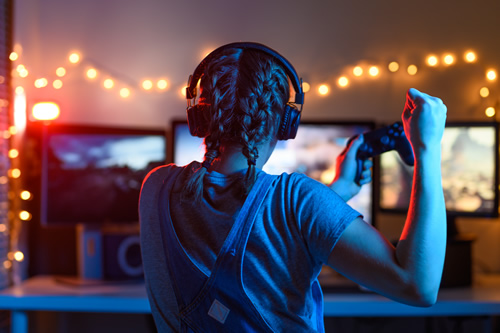When students are so deeply engaged in a task that they can’t wait to dive in — and at the same time, they’re learning fundamental skills that are critical for their success — it’s a magical combination.
That’s what a lucky group of 20 students at Horace Mann UCLA Community School are about to experience as they take part in an innovative afterschool program. The students will practice and reflect on 21st century skills such as problem solving, communication, and teamwork as they compete against each other in the popular online video game League of Legends.
A partnership between UCLA and the Los Angeles Unified School District (LAUSD), Mann is a public school serving students in grades 6-12. As director of the UCLA Community Schools Initiative, Dr. Christine Shen serves as a liaison between the school and the university. Her typical day consists of interacting with others and solving problems, and so she knows firsthand the value of these skills.
“When students move on to college or a career, there’s nothing they’re going to be doing by themselves,” she says. “There are very few careers where they won’t have to work with other people at some point.”
But getting kids to work well together isn’t always easy. “Our students come from home environments that might not be very nurturing,” Shen says, noting that Mann is a very high-poverty school. Many of its students have experienced trauma, and skills such as communicating and controlling their emotions can be challenging for them.
So when Shen heard about WeThink, a service in which students learn and practice those skills within a context that matters to them — competitive gaming, or esports — she immediately saw the program’s potential: “It seemed like something that was perfect for our needs.”
Especially now, when students are still learning remotely because of the pandemic — and K-12 leaders are searching for ways to connect them.
“Students are feeling isolated, and they miss their friends,” Shen says. “We were looking for outlets to engage them outside of academics.”
How it works
Esports is a perfect vehicle for learning important 21st century skills, because many of the attributes that students will need in the workforce correlate with success in gaming, says Dane Berman, director of business development for WeThink.
“These are everyday life skills that students are already using, but they don’t understand how to get better at them,” he says. “That’s where we can help.”
WeThink’s 12-week program focuses on developing 15 discrete skills that are grouped into five different categories: leadership, teamwork, communication, problem solving, and character. For instance, the skills students will be learning under “character” include grit, or the ability to persist in the face of difficult challenges; ownership, or taking responsibility for one’s actions or contributions to a particular outcome; and self-control.
The program begins with a discussion of each of these skills, what it means, and how it applies within gaming and the world at large. Then, students break into teams to play matches. Immediately after each match is over, the students are asked to rate themselves and their teammates on how well they applied these various skills within the game.
This self-reflection process is very powerful, and it has a big effect on how students approach the game the next time they play. “It’s fascinating to see how quickly their behavior changes from one game to the next as they consciously try to apply certain skills,” says WeThink CEO Katrina Salazar.
WeThink use a series of algorithmic models to measure each student’s growth in skills over time, based on their post-game assessments — and the company has seen impressive growth in these skills at other schools. That’s what Shen and others hope to replicate at Mann as well.
Getting started
Bringing the program to Mann posed a little bit of a challenge. Although it’s extremely accessible, the school needed to make sure that students could participate from home during the pandemic.
Mann provides Chromebooks to students, but those devices don’t have the processing power required for gaming. The school solved this challenge by distributing computers from a robotics and STEM education lab at UCLA to participants.
With the question of how students would access the game resolved, the next step was getting the program’s advisor, seventh and eighth grade math teacher Arbin Lubiano, up to speed.
A gamer himself, Lubiano took part in seven hours of professional development to learn how to teach the program’s 15 skills and have students assess themselves and others after game play.
Getting the devices into the hands of students during the pandemic has also been a challenge. The school has been distributing them to participants throughout the month of December, and students have been logging in to learn more about the game itself and play short simulated matches with computer-generated teammates and opponents while they wait for all of their peers to have a device.
When the program officially begins during the first week in January, the 20 participating students will meet online every Wednesday and Friday afternoon after school for two hours at a time. They’ll spend about 45 minutes of that time on lessons and reflection, and the rest playing League of Legends against each other in teams of five that will remain the same for the program’s duration.
As the program is set to begin next month, the students are eager — and so is Lubiano.
“I’m super excited,” he says. “I would like to see this become a mainstream activity, like any other sport within LAUSD.”
Note: This post is the first in a series that will follow the 12-week program and report on its progress.
- Motivating students using the Self-Determination Theory - April 17, 2024
- Michigan Virtual’s statewide workgroup releasing AI guidance for K-12 educators - April 17, 2024
- 5 obstacles AI can help schools overcome - April 16, 2024

